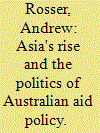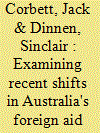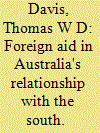|
|
|
Sort Order |
|
|
|
Items / Page
|
|
|
|
|
|
|
| Srl | Item |
| 1 |
ID:
143633


|
|
|
|
|
| Summary/Abstract |
The economic rise of developing Asia has given impetus to debates over the geographic orientation, strategy, organisation, and collaborative relationships of the Australian aid programme. This paper examines these debates, Australian government responses, and the politics underlying these responses. It points to, among things, the different ways in which the Labor Party and the Liberal–National Coalition have dealt with these issues, reflecting their different constituencies and foreign policy philosophies. The paper also assesses the future trajectory of Australian aid policy, in particular, the extent to which it is embracing the Chinese model of aid.
|
|
|
|
|
|
|
|
|
|
|
|
|
|
|
|
| 2 |
ID:
139988


|
|
|
|
|
| Summary/Abstract |
Australia was the first United Nations member state to commit to the United Nations Peacebuilding Fund when it was established in 2006, and it has made annual contributions since then. Australia has also made significant contributions towards enhancing gender equality in peace and security governance, most recently during its 2013–14 term of office on the United Nations Security Council, recognising that gender matters in and to all aspects of peacebuilding activity. This article offers a discourse-theoretical policy analysis of a range of Australian Agency for International Development guidelines and strategies addressing gender and peacebuilding issues, and reads these against the international framework to explore the discursive construction of gender-sensitive peacebuilding in Australia. The authors argue that the representations of peacebuilding in the documents they analyse shape how Australia engages in peacebuilding-related activities and inform how Australia is positioned internationally as a peacebuilding actor.
|
|
|
|
|
|
|
|
|
|
|
|
|
|
|
|
| 3 |
ID:
143915


|
|
|
|
|
| Summary/Abstract |
On taking office in late 2013, the incoming Abbott government proclaimed the advent of a new aid paradigm. This article asks whether or not this is the case. It does so by situating the new coalition policy in the context of more than two decades of development thinking. Focusing on the way Australian aid policy reflects trends in both global development and geopolitical discourses, the article parses out continuity and change. It finds that Australia's new aid paradigm is in fact largely the old aid paradigm reincarnate, with aid policy continuing to follow the well-established parameters outlined over decades of global thinking and practice that emphasise the significance of private-sector-led economic growth. However, while the overarching paradigm remains relatively intact, incremental change is also apparent, including alterations to the geographic focus, level and administration of the program.
|
|
|
|
|
|
|
|
|
|
|
|
|
|
|
|
| 4 |
ID:
108145


|
|
|
|
|
| Publication |
2011.
|
| Summary/Abstract |
In identifying the determinants of Australia's foreign aid relationship with developing countries (sometimes labelled 'the South'), this article examines the institutional history of official Australian development assistance since the Second World War. Several, often competing, narratives are delineated. These include: an ongoing questioning within the aid 'policy community', such as it is, of the purpose of foreign aid and the nature of its relationship to foreign policy; bureaucratic contestation over access to foreign aid resources; the desire of Australian foreign aid decision-makers to ensure their control, increasingly via managerialist methods, of aid delivery; and an avoidance by decision-makers of viewing the South as a politically relevant entity. Taken together, these narratives portray an aid programme that has become more 'professionalised' over time, but which finds itself institutionally inhibited from engaging meaningfully with the political nature of international development relationships.
|
|
|
|
|
|
|
|
|
|
|
|
|
|
|
|
|
|
|
|
|